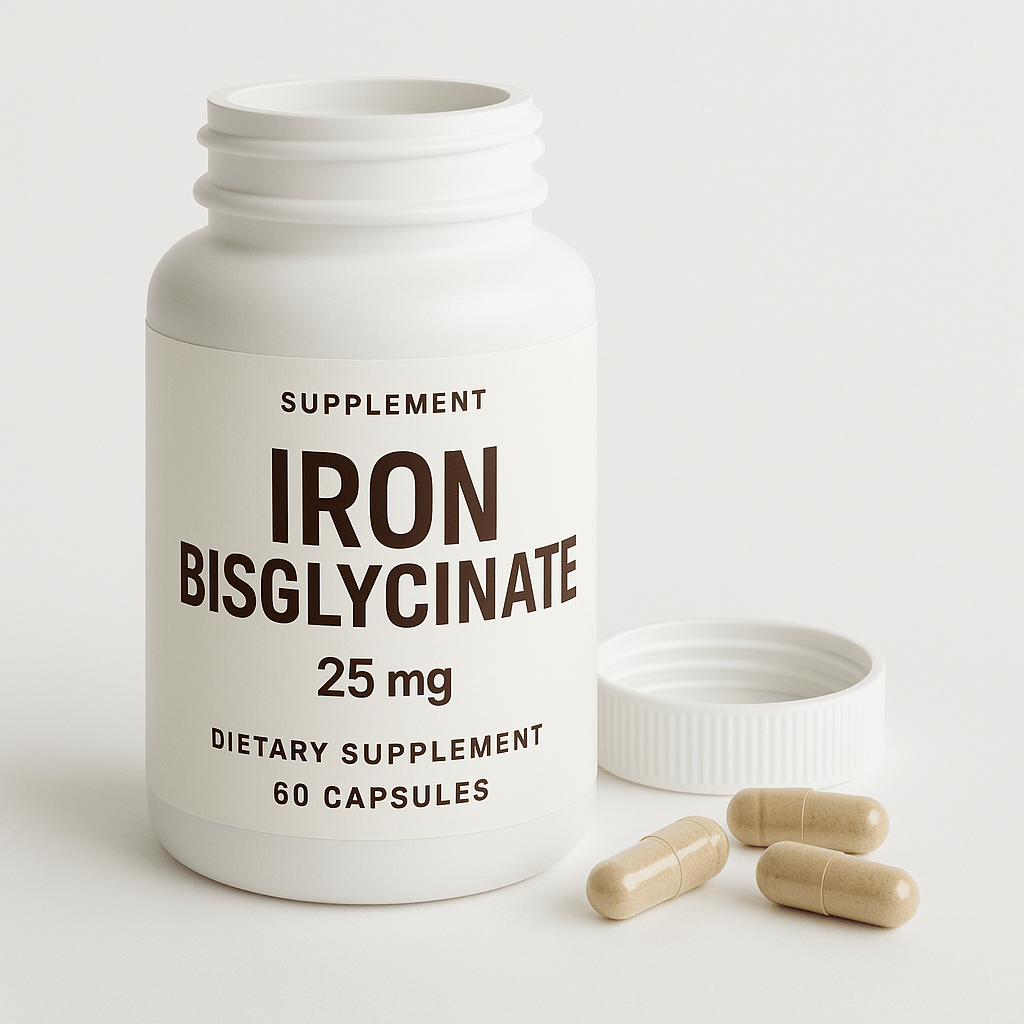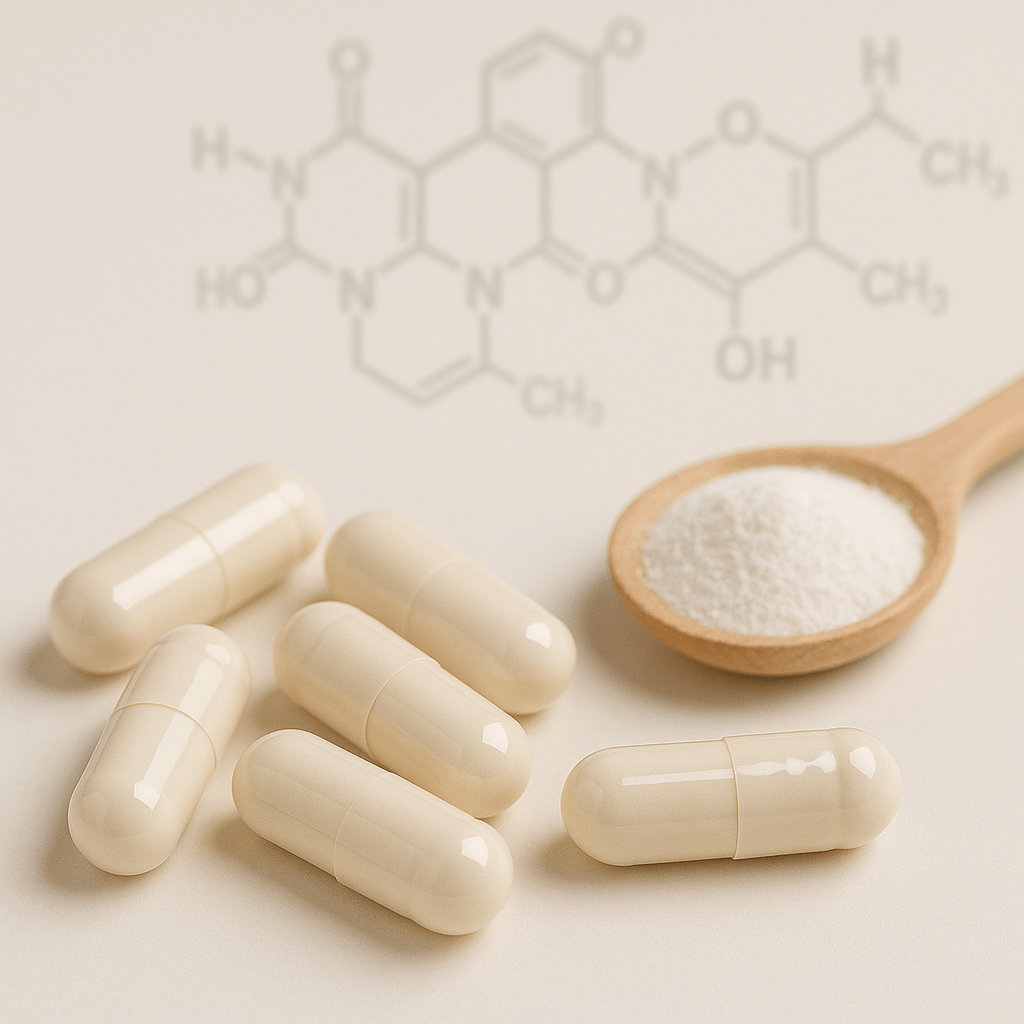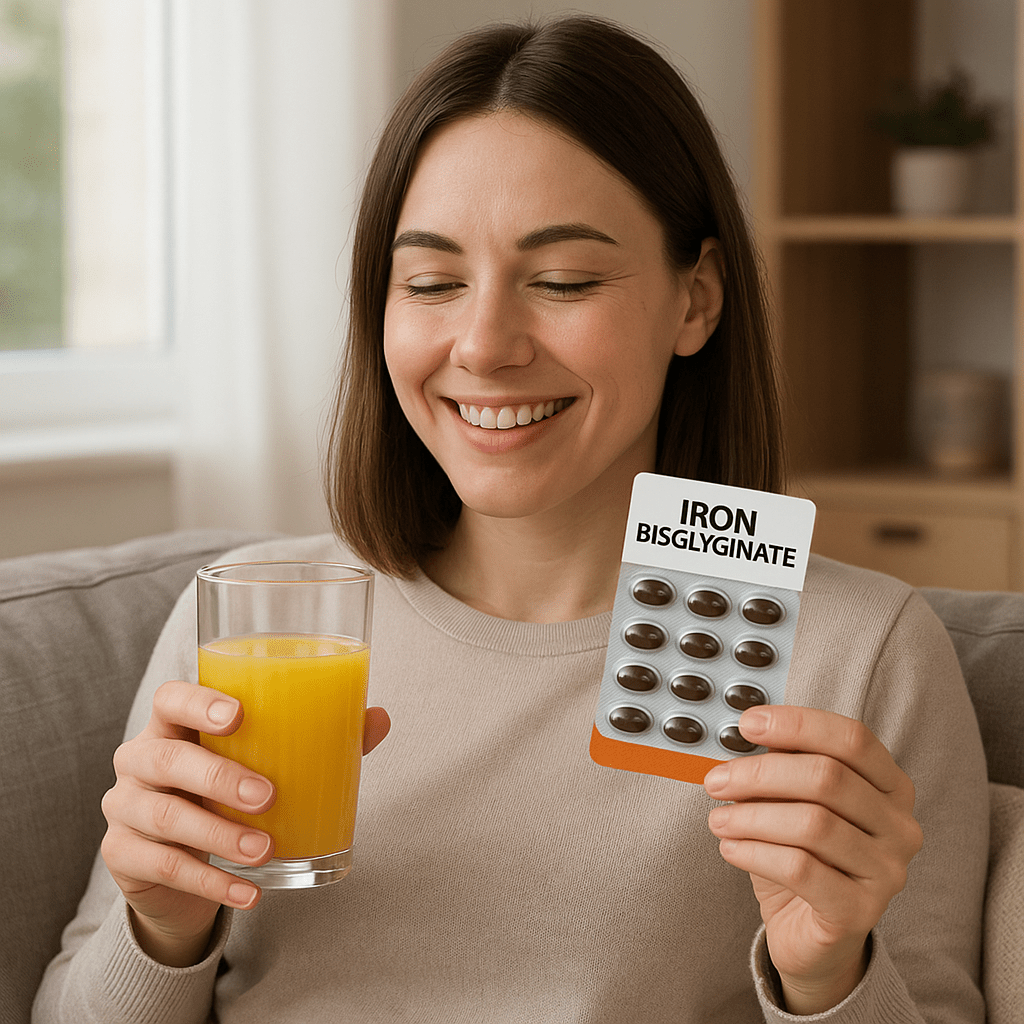Ferrous bisglycinate is becoming an increasingly popular choice among people looking for an effective and well-tolerated iron supplement. This unique iron compound is designed for optimal absorption and minimal side effects. Similar to other innovative dietary supplements, such as berberine, ferric bisglycinate is backed by promising scientific research that confirms its superiority over traditional forms of iron.
In this article, you will learn what ferric bisglycinate is, how it differs from other forms of iron, how scientific research evaluates its effectiveness, what benefits it offers pregnant women, children and athletes, and how to take it correctly for maximum benefit.
What is ferric bisglycinate? Composition and unique properties
Ferrous bisglycinate (also known as ferrous glycinate) is a chelated form of iron in which an iron molecule is bonded to two glycine (an amino acid) molecules. This compound is also known by the trade name Ferrochel®. Unlike conventional iron preparations such as ferrous sulfate or fumarate, the bisglycinate structure is designed to protect it from the effects of gastrointestinal acids and other food components that can interfere with iron absorption.
The chelated structure ensures that the iron remains stable and bioavailable throughout the digestive process, which increases the efficiency of absorption.
The World Health Organization (WHO) and the Food and Drug Administration (FDA) recognize this form of iron as safe and effective, especially for those who find conventional forms of iron uncomfortable.
If you are looking for a well-tolerated iron product, you can browse our carefully selected range of iron supplement capsules.
How does chelation improve iron absorption?
Chelation is a chemical process in which a mineral (in this case, iron) is combined with an amino acid or peptide. In the case of iron bisglycinate, the iron atom is chemically bonded to two glycine molecules, creating a stable complex that:
- protects the iron from interacting with other food components
- allows the iron to remain soluble even in the alkaline pH of the small intestine
- increases iron absorption through special intestinal receptors
- reduces the contact of the free iron ion with the intestinal wall, thereby reducing irritation
This chelation process allows the iron to avoid negative interactions with phytates, oxalates, and other components in food that normally reduce iron absorption. Studies show that due to these properties, the absorption of iron bisglycinate can be 2-4 times higher than that of traditional iron salts.
Clinical efficacy: what the research reveals
The efficacy of iron bisglycinate has been confirmed in various clinical trials conducted in different demographic groups. These studies provide important insights into its effectiveness in combating iron deficiency anemia.
Brazilian researchers conducted a randomized clinical trial in pregnant women comparing the effects of iron bisglycinate and ferrous sulfate on hemoglobin levels. The results showed that women who took the bisglycinate form achieved significantly higher hemoglobin levels and better blood ferritin levels compared to the ferrous sulfate group. It is important to note that there were significantly fewer reports of adverse digestive disorders in the bisglycinate group.
Another study conducted in Italy in children with iron deficiency anemia showed that iron bisglycinate was more effective in restoring normal levels of iron stores in the body in a shorter time compared to traditional iron supplements. The authors of the study emphasized not only the effectiveness of bisglycinate, but also that it was significantly better tolerated, which is especially important in the treatment of children.
Studies conducted in the field of sports medicine have shown that female athletes who took iron bisglycinate supplements achieved significantly better aerobic capacity indicators and reduced fatigue during intense training. This is associated with improved oxygen transport in the blood due to increased hemoglobin levels.
It is important to understand more about the problems of iron deficiency in order to properly assess the importance and practical significance of these studies.
The clinical advantage of iron bisglycinate lies not only in its ability to effectively increase hemoglobin and ferritin levels, but also in a significantly lower incidence of side effects, which leads to better compliance with the treatment regimen. Studies confirm that patients are more likely to continue treatment with bisglycinate than with traditional forms of iron.
Tolerability, Side Effects and Safety Profile
One of the biggest advantages of ferric bisglycinate is its significantly lower risk of side effects compared to traditional iron supplements. This is especially important given that gastrointestinal discomfort is a major reason why people stop taking iron supplements.
Scientific studies have shown that ferric bisglycinate causes significantly fewer gastrointestinal side effects than conventional iron supplements. Common side effects of conventional iron supplements – nausea, constipation, abdominal pain and a metallic taste in the mouth – are much less common or absent with the bisglycinate form.
From a safety perspective, Ferrochel® (the trade name for ferric bisglycinate) is a “generally recognized as safe” (GRAS) ingredient recognized by the FDA and is widely used for food fortification. The World Health Organization also recommends this form of iron for food fortification due to its safety and efficacy profile.
For pregnant women, iron bisglycinate is a particularly good choice because it is effective in increasing hemoglobin levels without causing the unpleasant side effects that are often associated with pregnancy. Studies show that pregnant women taking the bisglycinate form experience significantly less nausea and constipation, which is especially important during the first trimester.
For children, iron bisglycinate is also a safer choice because it is not only more easily tolerated, but also has a lower risk of overdose compared to other forms of iron.
This is especially important considering that iron overdose is one of the most common causes of medication poisoning in young children.
Those looking for a gentle iron supplement for the whole family can consider our top-quality best iron supplement for sensitive stomachs.
How to Effectively Take Iron Bisglycinate Supplements
Proper use of iron bisglycinate ensures maximum benefits and minimal side effects. While this form of iron is better tolerated than others, it is still important to follow certain guidelines.
The dosage of iron bisglycinate depends on age, gender and physiological condition:
- 18-25 mg of elemental iron per day is usually recommended for adult women
- 8-10 mg of elemental iron per day is usually sufficient for men
- 30-60 mg of elemental iron daily is recommended for pregnant women
the dosage for children is determined by age and weight, usually 5-10 mg of elemental iron per day - 15-30 mg per day may be recommended for athletes, especially in endurance sports
For optimal absorption, iron bisglycinate supplements are best taken on an empty stomach or between meals.
Unlike traditional forms of iron, the bisglycinate form can be taken with food, maintaining good bioavailability, but the best absorption is achieved when taken on an empty stomach.
Iron absorption is aided by vitamin C, so it is recommended to take iron supplements with citrus juice or vitamin C supplements. Conversely, iron supplements should be avoided with:
calcium supplements or dairy products (taken at least 2 hours apart)
coffee or tea (tannins reduce absorption)
foods high in phytate (e.g. whole grains, legumes)
some antibiotics (tetracyclines, quinolones)
Before starting iron supplements, it is recommended to consult a doctor and have a blood test to determine the level of iron in the body. This will help to avoid the risk of overdose and ensure an individually tailored dosage.
To find the supplement that is right for you, browse our range of iron supplement capsules.
Ferrous Bisglycinate vs. Other Iron Supplements
When choosing an iron supplement, it is important to understand the pros and cons of the different forms. Ferrous bisglycinate has unique properties that set it apart from other popular iron compounds.
| Iron form | Absorption efficiency | Side effects | Price | Suitability | ||
| Iron bisglycinate | High (25-40%) | Minimal | Higher | Pregnant women, children, people with sensitive digestion | ||
| Ferrous sulfate | Low (10-15%) | Frequent and strong | Low | Economy, short-term use | ||
| Ferrous fumarate | Average (15-20%) | Moderate intensity | Medium | Balance between price and tolerance | ||
|
Low-medium (12-17%) | Moderate intensity | Medium | In cases of mild iron deficiency |
Iron bisglycinate has the highest absorption rate of all iron supplements, meaning that the body needs a lower dose to achieve the same effect. This is especially important for long-term use, as it reduces the burden on the gastrointestinal tract.
Ferrous sulfate, although the cheapest and most widely available, often causes unpleasant side effects: constipation, nausea, abdominal pain and black stools. For these reasons, many patients discontinue treatment, despite the medical need.
Ferrous fumarate offers slightly better tolerability than sulfate, while maintaining a relatively affordable price. However, its absorption rates still lag significantly behind bisglycinate, especially under specific conditions, such as taking with food.
Ferrous gluconate is often recommended as a compromise between effectiveness and tolerability, but studies show that bisglycinate is still superior in both respects.
- The bisglycinate form is particularly recommended for:
- individuals with a history of gastrointestinal adverse events
- patients with gastrointestinal diseases (inflammatory bowel disease, irritable bowel syndrome)
- pregnant women, especially those suffering from morning sickness
- children who have difficulty accepting unpleasant-tasting supplements
- athletes seeking to optimize hemoglobin levels without negatively impacting training
For readers interested in antioxidant support in conjunction with iron supplementation, we recommend that you familiarize yourself with the metabolic benefits of resveratrol.
Conclusions
Ferrous bisglycinate is an advanced and scientifically proven form of iron supplementation that offers significant advantages over traditional alternatives. Its unique chelated structure ensures optimal absorption, minimizes side effects, and makes it suitable for use by a wide range of demographics.
Clinical studies clearly demonstrate the effectiveness of ferrous bisglycinate in increasing hemoglobin and ferritin levels in the blood, while avoiding the unpleasant gastrointestinal effects that often lead to discontinuation of traditional iron supplements. This advantage is especially important for pregnant women, children, athletes, and individuals with sensitive digestive tracts.
While ferrous bisglycinate may be slightly more expensive than conventional iron compounds, its higher bioavailability means that a lower dosage is required, and its better tolerability ensures consistent use and better long-term results. This makes it a cost-effective option for many consumers.
Before starting any supplement regimen, it is always recommended to consult a healthcare professional to determine the optimal dosage and assess your individual health condition. Regular blood tests can help monitor iron levels and ensure safe and effective supplementation.
Frequently Asked Questions
What is iron bisglycinate and how is it different from other iron supplements?
Iron bisglycinate is a patented form of iron chelated with glycine, providing better absorption and fewer side effects than conventional iron salts such as sulfate or gluconate.
Is iron bisglycinate safe during pregnancy or in children?
Yes, many research and health authorities (FDA, WHO) recognize its safety for pregnant women, nursing mothers, and children when used as directed. Always consult a doctor before use.
What are the possible side effects of iron bisglycinate?
Most users experience little or no gastrointestinal discomfort compared to traditional iron supplements; rare side effects may include mild nausea or digestive changes.
How should I take iron bisglycinate supplements for best results?
Take the supplement on an empty stomach or as directed, and avoid consuming calcium-rich or phytate-rich foods close to supplement time to ensure maximum absorption.
Can ferrous bisglycinate interact with other medications or supplements I am taking?
Iron supplements may interact with certain medications or nutrients (e.g., calcium, some antibiotics). Always check with your doctor to avoid interactions.





